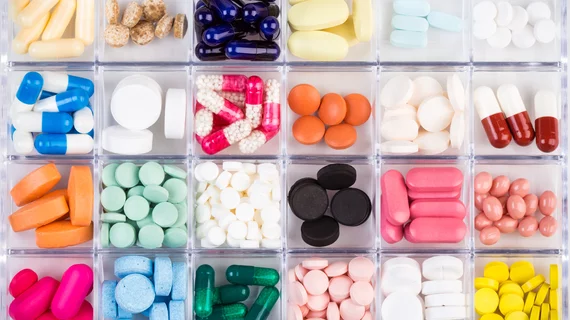1/3 of patients on DOACs take OTC supplements with potentially dangerous interactions
Most patients on direct oral anticoagulants (DOACs) supplement their regimen with over-the-counter (OTC) products, and one-third take at least one additional product that directly interferes with their blood thinners, according to work published in the Journal of the American Geriatrics Society.
DOACs are the gold standard for preventing stroke in patients with atrial fibrillation, Derjung M. Tarn, MD, PhD, and colleagues wrote in the journal, but those patients often aren’t followed as closely as they should be. Most people prescribed DOACs like apixaban won’t be tracked by specialized anticoagulation clinics, meaning they might not be aware of potential drug interactions between their medications and OTC products.
“DOACs such as apixaban are the most commonly prescribed anticoagulants, with advantages in that they do not require routine monitoring,” Tarn et al. wrote. “However, less frequent contact with healthcare professionals may contribute to poor patient knowledge about potential interactions between OTC products and DOACs.”
The authors surveyed 791 English- and Spanish-speaking patients between April and October of 2018 for their study, all of whom had been prescribed apixaban. Patients were queried about how often they took aspirin, ibuprofen/naproxen, acetaminophen and 13 other common dietary supplements, including Chinese herbs, fish oils, ginger and herbal teas.
Just 33% of people responded to the cross-sectional survey—a limitation of the study—but 98% of respondents said they used apixaban in conjunction with other OTC products. Of that subset, 33% reported taking at least one product that, when combined with their DOAC, could cause dangerous internal bleeding.
Around two-thirds of patients said they were either uncertain or incorrect about the potential for increased bleeding when combining their DOACs with certain OTC products like NSAIDs. Less knowledge about OTC products with potentially serious interactions was linked to a 46% increased likelihood of using those products.
“Significant numbers of patients take OTC products, particularly dietary supplements, with potentially serious interactions with the DOAC apixaban and appear to lack knowledge about potentially harmful interactions,” Tarn and co-authors said. “Interventions are needed to educate patients and healthcare providers about potential dangers of taking interacting OTC products in combination with apixaban, and data are needed on outcomes associated with concomitant apixaban-OTC product use.”

